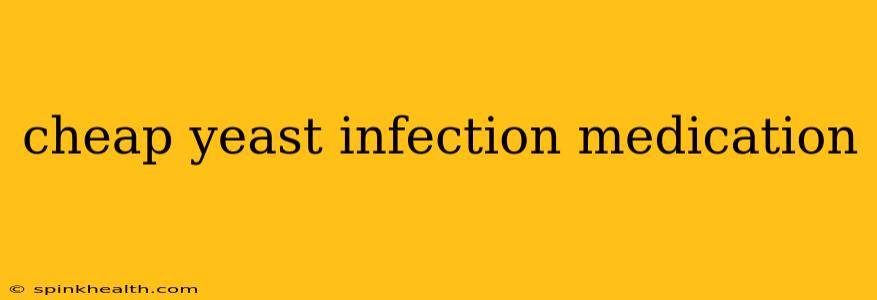Finding Affordable Treatment for Yeast Infections: A Practical Guide
Yeast infections, medically known as candidiasis, are a common and often uncomfortable experience. The burning, itching, and discharge can significantly impact daily life, making finding affordable treatment a priority. While a doctor's visit is always recommended for diagnosis and personalized treatment, let's explore ways to manage the cost of yeast infection medication.
This isn't a substitute for professional medical advice. Always consult a doctor before starting any new medication, including over-the-counter treatments.
Understanding Yeast Infection Treatments
Most yeast infections are caused by an overgrowth of Candida albicans fungus. Thankfully, effective treatments are readily available, primarily falling into two categories:
-
Over-the-counter (OTC) antifungal creams and suppositories: These are often the first line of defense for mild yeast infections and are generally less expensive than prescription medications. Active ingredients to look for include miconazole, clotrimazole, and terconazole.
-
Prescription antifungal medications: For more severe or recurring infections, a doctor might prescribe stronger oral or topical medications like fluconazole (Diflucan). These are typically more costly but highly effective.
How Can I Get Cheap Yeast Infection Medication?
This is a question many women (and men, as men can also experience yeast infections) ask. Here are several avenues to explore:
1. Generic Medications: Opting for generic versions of antifungal medications, such as those containing clotrimazole or miconazole, can significantly reduce costs. Generic medications contain the same active ingredients as brand-name drugs but are typically sold at a lower price.
2. Comparing Prices at Different Pharmacies: Prices can vary widely between pharmacies, both chain stores and independent ones. Checking prices online or calling ahead to compare costs before purchasing is always a good idea. Consider using pharmacy comparison websites.
3. Utilizing Discount Programs and Coupons: Many pharmacies offer discount programs or accept manufacturer coupons that can lower the out-of-pocket expense for medications. Look for coupons online or in pharmacy newsletters.
Are There Home Remedies for Yeast Infections?
While home remedies might provide temporary relief from symptoms, they shouldn't replace medical treatment for a confirmed yeast infection. Some individuals suggest yogurt with live and active cultures (probiotics) or diluted apple cider vinegar, but these should only be considered complementary and not a cure. A proper diagnosis from a healthcare professional is essential.
What if I Can't Afford Prescription Yeast Infection Medication?
Several options exist for those facing financial barriers to accessing healthcare:
-
Patient assistance programs: Pharmaceutical companies often offer patient assistance programs (PAPs) that provide free or discounted medications to eligible individuals. Check the websites of medication manufacturers for more information.
-
Community health clinics: Many communities have free or low-cost clinics that provide healthcare services, including treatment for yeast infections.
-
Hospital financial assistance: Hospitals often have financial assistance programs that can help patients afford medical care.
-
State and local health departments: Contact your local health department to inquire about resources and assistance programs in your area.
How Can I Prevent Yeast Infections?
Prevention is key! Here's what you can do:
-
Maintain good hygiene: Regularly clean the genital area with mild soap and water.
-
Wear breathable underwear: Opt for cotton underwear rather than synthetic fabrics to prevent moisture buildup.
-
Control blood sugar levels: For individuals with diabetes, maintaining healthy blood sugar levels can reduce the risk of yeast infections.
-
Avoid douching: Douching disrupts the natural balance of vaginal flora, increasing the risk of infection.
Remember, while finding affordable treatment is crucial, proper diagnosis and treatment are paramount. Don't hesitate to consult a healthcare professional if you suspect a yeast infection or experience persistent symptoms. Seeking timely medical attention can prevent complications and ensure your comfort and well-being.

